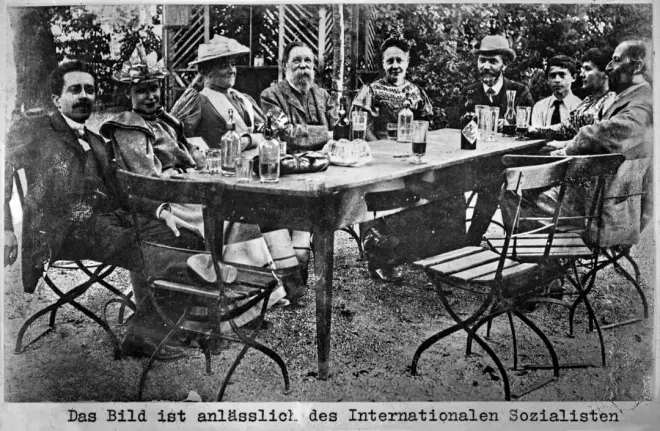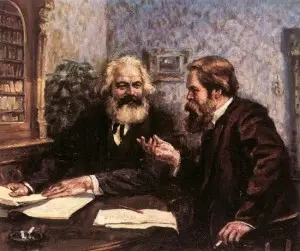恩格斯 在马克思墓前的讲话

在马克思墓前的讲话①
3月14日下午两点三刻,当代最伟大的思想家停止思想了。让他一个人留在房里总共不过两分钟,等我们再进去的时候,便发现他在安乐椅上安静地睡着了——但已经是永远地睡着了。
这个人的逝世,对于欧美战斗着的无产阶级,对于历史科学,都是不可估量的损失。这位巨人逝世以后所形成的空白,在不久将来就会使人感觉到。
正象达尔文发现有机界的发展规律一样,马克思发现了人类历史的发展规律,即历来为繁荣芜杂的意识形态所掩盖着的一个简单事实:人们首先必须吃、喝、住、穿,然后才能从事政治、科学、艺术、宗教等等;所以,直接的物质的生活资料的生产,因而一个民族或一个时代的一定的经济发展阶段,便构成为基础,人们的国家制度、法的观点、艺术以至宗教观念,就是从这个基础上发展起来的,因而,也必须由这个基础来解释,而不是象过去那样做的相反。
不仅如此。马克思还发现了现代资本主义生产方式和它所产生的资产阶级社会的特殊的运动规律。由于剩余价值的发现,这里就豁然开朗了,而先前无论资产阶级经济学家或者社会主义批评家所做的一切研究都只是在黑暗中摸索。
一生中能有这两个发现,该是很够了。甚至只要能作出一个这样的发现,也已经是幸福的了。但是马克思在他所研究的每一个领域(甚至在数学领域)都有独到的发现,这样的领域是很多的,而且其中任何一个领域他都不是肤浅地研究的。
这位科学巨匠就是这样。但是这在他身上远不是主要的。在马克思看来,科学是一种在历史上起推动作用的、革命的力量。任何一门理论科学中的每一个新发现,即使它的实际应用甚至还无法预见,都使马克思感到由衷喜悦,但是有了立即会对工业、对一般历史发展产生革命影响的发现的时候,他的喜悦就完全不同了。例如,他曾经密切地注意电学方面各种发现的发展情况,不久前,他还注意了马赛尔·德普勒的发现②。
因为马克思首先是一个革命家。以某种方式参加推翻资本主义社会及其所建立的国家制度的事业,参加赖有他才第一次意识到本身地位和要求,意识到本身解放条件的现代无产阶级的解放事业,——这实际上就是他毕生的使命。斗争是他得心应手的事情。而他进行斗争的热烈、顽强和卓有成效,是很少见的。最早的《莱茵报》(1842年)③,巴黎的《前进报》(1844)④,《德意志—布鲁塞尔报》(1847年)⑤,《新莱茵报》(1848—1849年)⑥,《纽约每日论坛报》(1852—1861年)⑦,以及许多富有战斗性的小册子,在巴黎、布鲁塞尔和伦敦各组织中的工作,最后是创立伟大的国际工人组织协会,作为这一切工作的完成——老实说,协会的这位创始人即使别的什么也没有做,也可以拿这一成果引以为豪。
正因为这样,所以马克思是当代最糟嫉恨和最受污蔑的人。各国政府——无论专制政府或共和政府——都驱逐他;资产者——无论保守派或极端民主派——都纷纷争先恐后的诽谤他,诅咒他。他对这一切毫不在意,把它们当做蛛丝一样轻轻抹去,只是在万分必要时才给与答复。现在他逝世了,在整个欧洲和美洲,从西伯利亚矿井到加利福尼亚,千百万革命战友无不对他表示尊敬、爱戴和悼念,而我敢大胆地说:他可能有过许多敌人,但未必有一个私敌。
他的英名和事业将永垂不朽!
原文是德文
选自《马克思恩格斯全集》第19卷第374-376页
《马克思恩格斯选集》第3卷第574-576页
载于1883年3月22日《社会民主党人报》第13号

注释:
①:这是恩格斯1883年3月17日在伦敦海格特公墓安葬马克思时用英语发表的讲话,标题是我们 [编者?——上传者注] 加的。
②:在1882年慕尼黑电器展览会上,法国物理学家马赛尔·德普勒展出了他在米斯巴赫至慕尼黑之间架设的第一条实验性输电线路。
③:《莱茵政治、商业和工业日报》(《Rheinische Zeitung für Politik,Handel und Gewerbe》)是1842年1月1日至1843年3月31日在科伦出版的 日报。该报是莱茵省一些反对普鲁士专制政体的资产阶级人士创办的。该报曾吸收几个青年黑格尔分子撰稿。1842年4月起马克思为该报撰稿,同年10月起成为该报的编辑之一。《莱茵报》也发表了恩格斯的许多文章。在马克思担任编辑期间,该报日益具有明显的革命民主主义性质。政府对《莱茵报》进行了特别严格的检查,后来把它封闭了。
④:《前进报》(《Vorwärts!》)是德国的报纸,该报于1844年1月至12月在巴黎出版,每周出两次。马克思和恩格斯在该报发表过文章。马克思从1844年夏天起开始密切地参与该报的编辑工作,该报在他的影响下开始具有共产主义性质;该报对普鲁士反动制度开展了尖锐的批评。根据普鲁士政府的要求,基佐内阁于1845年1月下令把马克思及该报其他一些撰稿人驱逐出法国;《前进报》因而停刊。
⑤:《德意志—布鲁塞尔报》(《Deutsche-Brüsseler-Zeitung》)是侨居布鲁塞尔的德国流亡者创办的;1847年1月创刊,1848年2月停刊。起初,该报的方针是由它的编辑、小资产阶级民主主义者伯恩施太德 [伯恩施坦?不确定——上传者注] 决定的,他力图调和民主营垒的各种派别。但从1847年夏天马克思、恩格斯以及他们的战友在该报发表文章以后,报纸就日益成了宣传革命民主主义和共产主义思想的喉舌。1847年9月起,马克思和恩格斯成了该报的经常撰稿人并对该报的方针发生直接影响,1847年最后几个月,他们实际上已经掌握了该报的编辑工作。在马克思和恩格斯的领导下,该报成了形成中的无产阶级革命政党——共产主义者同盟的机关报。
⑥:《新莱茵报。民主派机关报》(《Neue Rheinische Zeitung. Organ der Demokratie》)1848年6月1日至1849年5月19日每日在科伦出版,主编是马克思;参加编辑部的有恩格斯、威·沃尔弗、格·维尔特、斐·沃尔弗、恩·德朗克、斐·弗莱里格拉特和亨·毕尔格尔斯。
民主派中无产阶级一翼的战斗机关报《新莱茵报》起了人民群众教育者的作用,号召他们起来和反革命作斗争。决定报纸对德国和欧洲革命最重要问题的立场的社论,通常是由马克思和恩格斯执笔。
《新莱茵报》的坚决的、不妥协的立场,战斗的国际主义精神,它对普鲁士政府以及科伦地方当局的政治上的揭发,使该报在创刊后的最初几个月就受到封建保皇派和自由派资产阶级报刊的攻击,并且受到政府的迫害,而这种迫害在1848年11—12月普鲁士反革命政变以后更变本加厉了。
尽管受到种种迫害和警察局的阻挠,《新莱茵报》还是英勇地捍卫了革命民主主义的利益,捍卫了无产阶级的利益。1849年5月,在反革命势力全面进攻的攻势下,普鲁士政府借口马克思没有普鲁士国籍而下令把他驱逐出境。由于马克思被驱逐出境和《新莱茵报》其他编辑遭受迫害,该报停刊了。1849年5月19日,《新莱茵报》用红色油墨印出了最后一号即第301号。报纸的编辑在致科伦工人的告别书中说:“无论何时何地,他们的最后一句话始终是:工人阶级的解放!”
⑦:《纽约每日论坛报》(《New-York Daily Tribune》是美国的一家报纸,1841年至1924年出版。该报由著名的英国新闻工作记者和政治活动家霍拉斯·格里利创办,在五十年代中期以前是美国辉格党左翼的机关报,后来是共和党的机关报,四十至五十年代,该报站在进步的立场上反对奴隶占有制。参加该报工作的有许多著名的美国作家和新闻工作者,受空想社会主义思想影响的查理·德纳从四十年代末起是该报的编辑之一。马克思从1851年8月开始为该报撰稿,一直到1862年3月,继续了10年以上。为《纽约每日论坛报》写的文章,很大一部分是马克思约恩格斯写的。恩格斯的文章多半是在曼彻斯特写的,许多文章上注明的日期并不是写作的真正日期,因为马克思在论文上通常标明的是寄往纽约的日期。有些论文是在伦敦写的,而马克思注明的却是巴黎、维也纳或柏林。马克思和恩格斯在《纽约每日论坛报》上写的文章,涉及国际政治、工人运动、欧洲各国的经济发展、殖民地扩张、被压迫国家和附属国家的民族解放运动等等极其重要的问题。在欧洲的反动时期里,马克思和恩格斯利用这个发行很广的美国报纸,一具体材料来揭露资本主义社会的种种病态和这个社会所固有的各种不可调和的矛盾,并说明资产阶级的局限性。
《纽约每日论坛报》的编辑部对马克思和恩格斯的文章常常随意处理,有些文章不署作者名字而作为编辑部的社论刊登出去。自1885年中期,马克思和恩格斯发表的一切文章都被去掉了署名。有时编辑部竟然还删改文章内容,并任意加注日期。编辑部的这些行为曾一再引起马克思的抗议。从1857年秋天起,由于美国发生经济危机,报纸的财政状况受到影响,编辑部向马克思提出减少他对《纽约每日论坛报》通讯的数量。到美国国内战争开始时,马克思完全停止了撰稿。马克思所以和《纽约每日论坛报》断绝关系,很大的一个原因是编辑部内主张同各蓄奴州妥协的人的势力加强和该报纸离开了进步立场。后来该报的方向更是日益右倾。

英文版
"On the 14th of March, at a quarter to three in the afternoon, the greatest living thinker ceased to think. He had been left alone for scarcely two minutes, and when we came back we found him in his armchair, peacefully gone to sleep-but forever.
"An immeasurable loss has been sustained both by the militant proletariat of Europe and America, and by historical science, in the death of this man. The gap that has been left by the departure of this mighty spirit will soon enough make itself felt.
"Just as Darwin discovered the law of development of organic nature, so Marx discovered the law of development of human history: the simple fact, hitherto concealed by an overgrowth of ideology, that mankind must first of all eat, drink, have shelter and clothing, before it can pursue politics, science, art, religion, etc.; that therefore the production of the immediate material means of subsistence and consequently the degree of economic development attained by a given people or during a given epoch form the foundation upon which the state institutions, the legal conceptions, art, and even the ideas on religion, of the people concerned have been evolved, and in the light of which they must, therefore, be explained, instead of vice versa, as had hitherto been the case.
"But that is not all. Marx also discovered the special law of motion governing the present-day capitalist mode of production and the bourgeois society that this mode of production has created. The discovery of surplus value suddenly threw light on the problem, in trying to solve which all previous investigations, of both bourgeois economists and socialist critics, had been groping in the dark.
"Two such discoveries would be enough for one lifetime. Happy the man to whom it is granted to make even one such discovery. But in every single field which Marx investigated -- and he investigated very many fields, none of them superficially -- in every field, even in that of mathematics, he made independent discoveries.
"Such was the man of science. But this was not even half the man. Science was for Marx a historically dynamic, revolutionary force. However great the joy with which he welcomed a new discovery in some theoretical science whose practical application perhaps it was as yet quite impossible to envisage, he experienced quite another kind of joy when the discovery involved immediate revolutionary changes in industry and in historical development in general. For example, he followed closely the development of the discoveries made in the field of electricity and recently those of Marcel Deprez.
"For Marx was before all else a revolutionist. His real mission in life was to contribute, in one way or another, to the overthrow of capitalist society and of the state institutions which it had brought into being, to contribute to the liberation of the modern proletariat, which he was the first to make conscious of its own position and its needs, conscious of the conditions of its emancipation. Fighting was his element. And he fought with a passion, a tenacity and a success such as few could rival. His work on the first Rheinische Zeitung (1842), the Paris Vorw?rts! (1844), Br?sseler Deutsche Zeitung (1847), the Neue Rheinische Zeitung (1848-49), the New York Tribune (1852-61), and in addition to these a host of militant pamphlets, work in organisations in Paris, Brussels and London, and finally, crowning all, the formation of the great International Working Men's Association -- this was indeed an achievement of which its founder might well have been proud even if he had done nothing else.
"And, consequently, Marx was the best-hated and most calumniated man of his time. Governments, both absolutist and republican, deported him from their territories. Bourgeois, whether conservative or ultra-democratic, vied with one another in heaping slanders upon him. All this he brushed aside as though it were cobweb, ignoring it, answering only when extreme necessity compelled him. And he died beloved, revered and mourned by millions of revolutionary fellow-workers -- from the mines of Siberia to California, in all parts of Europe and America -- and I make bold to say that though he may have had many opponents he had hardly one personal enemy.
"His name will endure through the ages, and so also will his work!"
*啊,英文版是我复制的,但中文版和注释是我手敲的,英文原文在百度百科能找到,搜《在马克思墓前的讲话》就能找到。


马克思恩格斯两位导师的伟大友谊万岁!
伟大的马克思主义万岁!
*图片均来自网络

